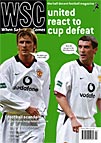 Tirol Innsbruck, a familiar name from the Champions League, has vanished from sight. They could be a long time coming back, as Roderick Stewart writes
Tirol Innsbruck, a familiar name from the Champions League, has vanished from sight. They could be a long time coming back, as Roderick Stewart writes
The dramatic collapse of Tirol Innsbruck last year, from Champions League qualifiers to the third division, was probably the most extreme case yet of a club being punished for financial misdemeanours. Now, in a new guise, the club have started the long haul back.
FC Tirol Milch Innsbruck, to give them their full name, were established as Austria’s leading team, with three consecutive league championships. This supremacy ended last June when the club failed to post a bond of €4.5 million with the league, lost their licence and were declared bankrupt with debts of at least €16 million. An inept management intent on buying success seems to have been the cause. An expensive new 18,500-seat stadium and an annual wage bill of €10 million were just too much for a club with an average home attendance of 10,000.
The collapse prompted efforts by Tyrolean business and government to build a successful local team. A new club was formed with a nostalgic name, FC Wacker Tirol: FC Wacker Innsbruck was the old club name in the days before sponsors started imposing themselves. Wacker then formed a Spielgemeinschaft (playing community) with WSG Wattens, a mid-table third division team but, more importantly, one with a licence. Thus was born the mouthful that is SPG WSG Swarovski Wattens/FC Wacker Tirol.
Wattens/Wacker are more serious than they sound. They are one of the few full-time teams in the three third divisions. Most of the players and coaching staff came from Wattens. The only links with Tirol are two veteran players, the club secretary, the stadium and the fans. The supporters have been surprisingly loyal, with 3,500 at the first game of the season and 8,500 at one. They have been rewarded with success: by the winter break, two-thirds of the way through the season, Wattens/Wacker led the league by nine points, set for a place in one of the two promotion play-offs.
The Wattens fans haven’t had much say in all this, mainly because there were never very many of them: average attendance last season was only 300. Some resent what they see as the theft of their club’s identity, but others seem happy to grab on to the coat-tails of success. All are concerned over what might happen after promotion. The club say that the Spielgemeinschaft will continue, but the fans worry that the name will change to FC Wacker Innsbruck, with appropriate sponsor inserted.
Whatever their name next season, the club might have trouble finding money for the new players they will need to stay in the second division. Local government took over the running of the stadium after the bankruptcy but now appear less committed and might cover only half the costs in future.
Instead of a rapid return to the top, Wattens/Wacker might repeat the story of a team which profited from Tirol’s demise. Wiener Sport-Club were Austria’s leading team in the late 1950s, winning two titles and defeating Juventus 7-0 at home in the European Cup (they’re still talking about that one). They were first division regulars until 1994 when poor management and high wages caused a crisis. Sport-Club quickly sank to the fourth division due to a disappearing sponsor and a series of bad decisions. At one stage the fans had to turn out for the required reserve team. They have since climbed back and last season, with the backing of new sponsors, won their third division league. They also swapped a “C” for a “K” to become Wiener Sportklub AXA Wienstrom.
Sportklub lost a play-off, but were later promoted in the reshuffle to fill the gap left by Tirol. The second division has not been kind. The first-team squad is now full-time, too large and too expensive – many players had already been contracted for the 2002-03 season before they were given promotion, then players more suitable for the higher division had to be found. Some of the 11 newcomers haven’t performed as expected. Attendances are down, averaging 1,200 compared to 2,000 last season. Part of this may be due to games switching from Sunday to Tuesday or Friday. But many of their fans seem to prefer a winning team of old faces to a struggling one of new faces in a higher division.
If both teams finish the season where they are now, they will be joined by the other two regional league winners in the play-offs; a pair of matches for the two places in the second division. The draw has already taken place, but, contrary to any notion of natural justice, Wattens/Wacker will not be playing Wiener Sportklub for their futures.
From WSC 194 April 2003. What was happening this month